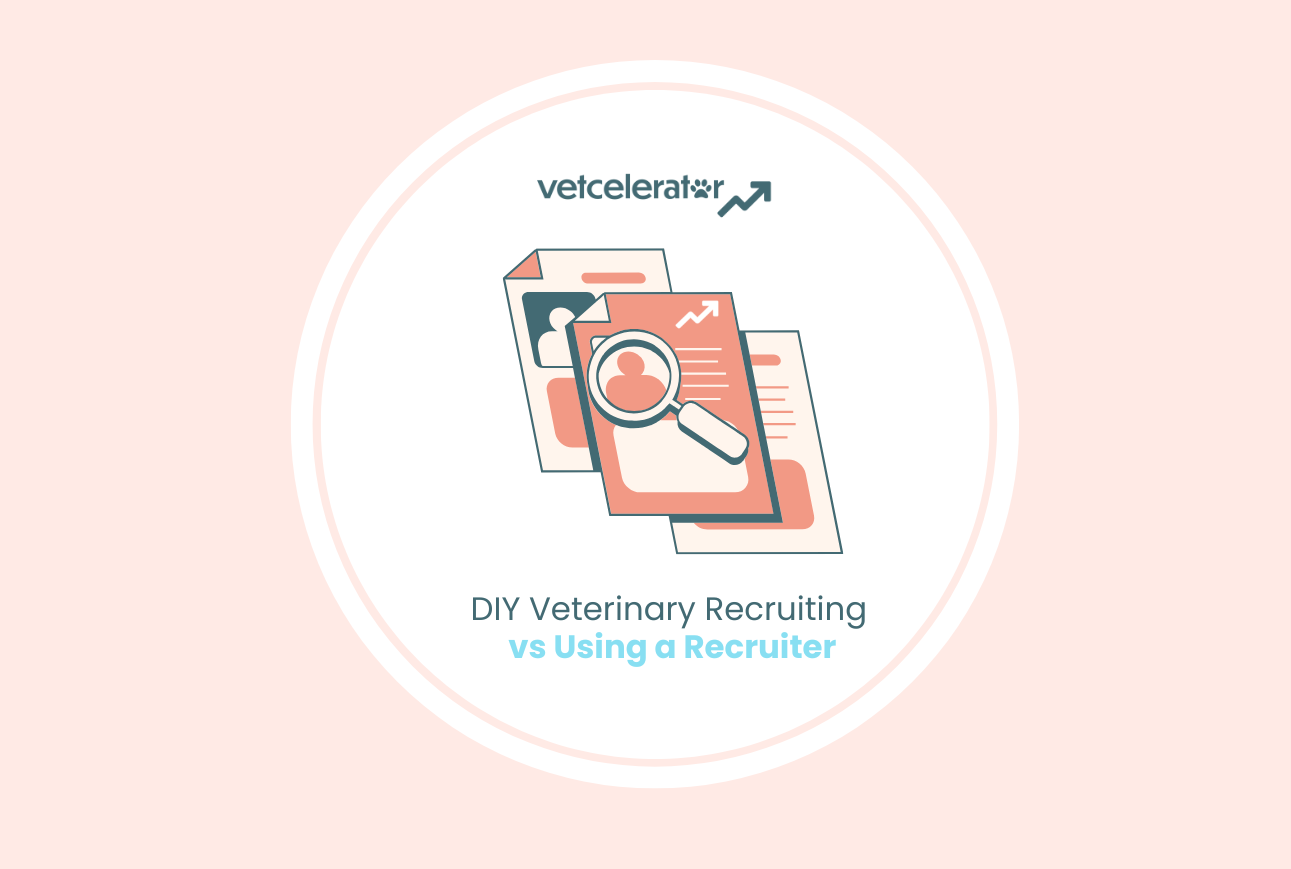
If you own or manage a veterinary practice, you already know that your staff is the heartbeat of your clinic. Every team member, from veterinarians and veterinary technicians to receptionists and kennel attendants, plays a role in delivering exceptional patient care and building strong client relationships.
When it’s time to hire, it’s not just about filling a position. It’s about finding the right person who can thrive in a fast-paced, emotionally charged, and deeply rewarding career. The pressure kicks in. Suddenly, you’re juggling:
- Deciding exactly what skills and qualifications the role requires
- Determining a competitive salary and benefits package
- Writing an appealing and compliant job ad
- Posting the role to the right platforms
- Sorting through resumes
- Scheduling and conducting interviews
- Checking references and making an offer
All of this needs to be done while still running your practice, managing your staff, and caring for your pet patients. This is where you face a critical decision:
Do you take on veterinary recruiting yourself, or do you bring in a professional recruiter that specializes in the veterinary industry?
Does DIY Veterinary Recruiting Work?
The biggest advantage of DIY recruiting for veterinary practices is control. You know your clinic’s culture, your patients, and your community. You can decide when to post, how to schedule interviews, and exactly what you want in a candidate.
But that control comes with a steep time and energy cost. There are several steps required when recruiting veterinarians or for any other position.
1. Writing a Veterinary Job Ad
A strong veterinary job ad should capture:
- The mission and values of your practice
- The equipment and technology you use (e.g., digital radiography, specific in-house labs, ultrasound)
- Opportunities for professional development (e.g., CE, mentorship, specialty training)
- A realistic preview of the role’s daily pace and caseload
A veterinary job ad also needs to comply with state and federal labor laws. A vague or poorly structured ad can lead to a flood of unqualified applicants or, worse, zero applicants.
In today’s veterinary job market, candidates have options. If your ad doesn’t stand out, they’ll simply scroll past.
2. Posting to the Right Job Platforms
Where you post your role matters. Veterinary-specific job boards, local veterinary association listings, and targeted social media ads will get you in front of the right audience. Post in the wrong place, and you’ll attract candidates with no veterinary background at all.
3. Screening Veterinary Resumes
Where you post your role matters. Veterinary-specific job boards, local veterinary association listings, and targeted social media ads will get you in front of the right audience. Post in the wrong place, and you’ll attract candidates with no veterinary background at all.
4. The Interviewing Process
You may get lucky and find a great candidate quickly, but more often, you’ll spend hours interviewing applicants who:
- Can’t handle your clinic’s caseload
- Lack the technical skills you need
- Struggle with client communication
- Aren’t a cultural fit for your team
Without a structured screening and interview process, you risk wasting valuable hours on mismatched applicants.
The Bottom Line
DIY recruiting can work… but it means you’re wearing the hats of practice manager, HR, and recruiter all at once (and potentially other in-clinic roles, too).
Is a Recruiter for Veterinary Hiring Worth It?
Partnering with a recruiting team, especially one that specializes in veterinary medicine, changes the game. Instead of handling every step yourself, you gain a dedicated partner whose only job is to find you the best candidates. Why go with veterinary recruiting services?
1. Veterinary-Specific Job Ads
Recruiters who know the veterinary industry understand what appeals to candidates. Veterinary recruiters know how to highlight your advanced equipment, team culture, community reputation, and what’s great about your specific veterinary practice. They also ensure your ad is legally compliant and optimized for maximum visibility.
For example, a generic ad might say, “Seeking Veterinary Technician with experience.” A veterinary recruiter’s ad might say, “Join our AAHA-accredited hospital with a fully equipped surgical suite, IDEXX in-house lab equipment, and a commitment to technician empowerment.” The difference? One gets scrolled past because it tells the job candidate nothing about your clinic’s brand; the other sparks interest.
2. Access to Hidden Talent
Veterinary recruiters can tap into networks of passive candidates. These are veterinary professionals who aren’t actively job hunting but would consider a change for the right opportunity.
This candidate pool is a fantastic resource in veterinary medicine, where qualified candidates are often already employed and not browsing job boards.
3. Pre-Vetted Candidates Only
You won’t waste time interviewing someone who’s never placed an IV catheter or can’t explain a dental chart. Veterinary recruiters screen for technical skills and soft skills, such as:
- Client communication and empathy
- Ability to handle emotional cases (e.g., euthanasia discussions)
- Comfort with high-volume days and emergency situations
By the time a candidate reaches your desk, they’ve already passed multiple filters and a screening.
4. Faster Hires, Less Downtime
Every day a veterinary position is unfilled, your existing team feels the strain: longer shifts, higher caseloads, and increased burnout risk. Recruiters for veterinary clinics can cut your hiring timeline significantly, helping you stabilize your team sooner.
5. Industry Insight & Guidance
Veterinary recruiters know current salary benchmarks, benefit trends, and what candidates are prioritizing (flexible scheduling is huge right now). They can guide you in making offers that attract talent and retain them.
How to Choose the Right Veterinary Recruiter
Not all veterinary recruiting teams are created equal. You want someone who:
- Understands the challenges of veterinary hiring
- Has a strong network of DVMs, LVTs, and support staff
- Communicates clearly and regularly throughout the process
- Aligns with your clinic’s values and long-term vision
Vetcelerator has an entire blog on this topic: 5 Qualities to Look for in a Veterinary Recruiter. This blog breaks down how to tell if a recruiter is the right fit for your practice.
Deciding Between Your Time and Your Team’s Future
DIY recruiting gives you control, but at the cost of your time and focus. In veterinary medicine, where every day is already packed with surgeries, consults, emergencies, and client education, adding the full recruiting process to your plate can stretch you too thin. A veterinary recruiting team protects your time, your energy, and your clinic’s culture by finding candidates who will thrive long-term.
The question should not be, “Can I do it myself?” Instead, ask yourself, “Is my time better spent recruiting or caring for patients and leading my team while an expert finds the right people for me?” If you are looking for an experienced veterinary recruiter to support your hiring efforts, contact us at Vetcelerator.




